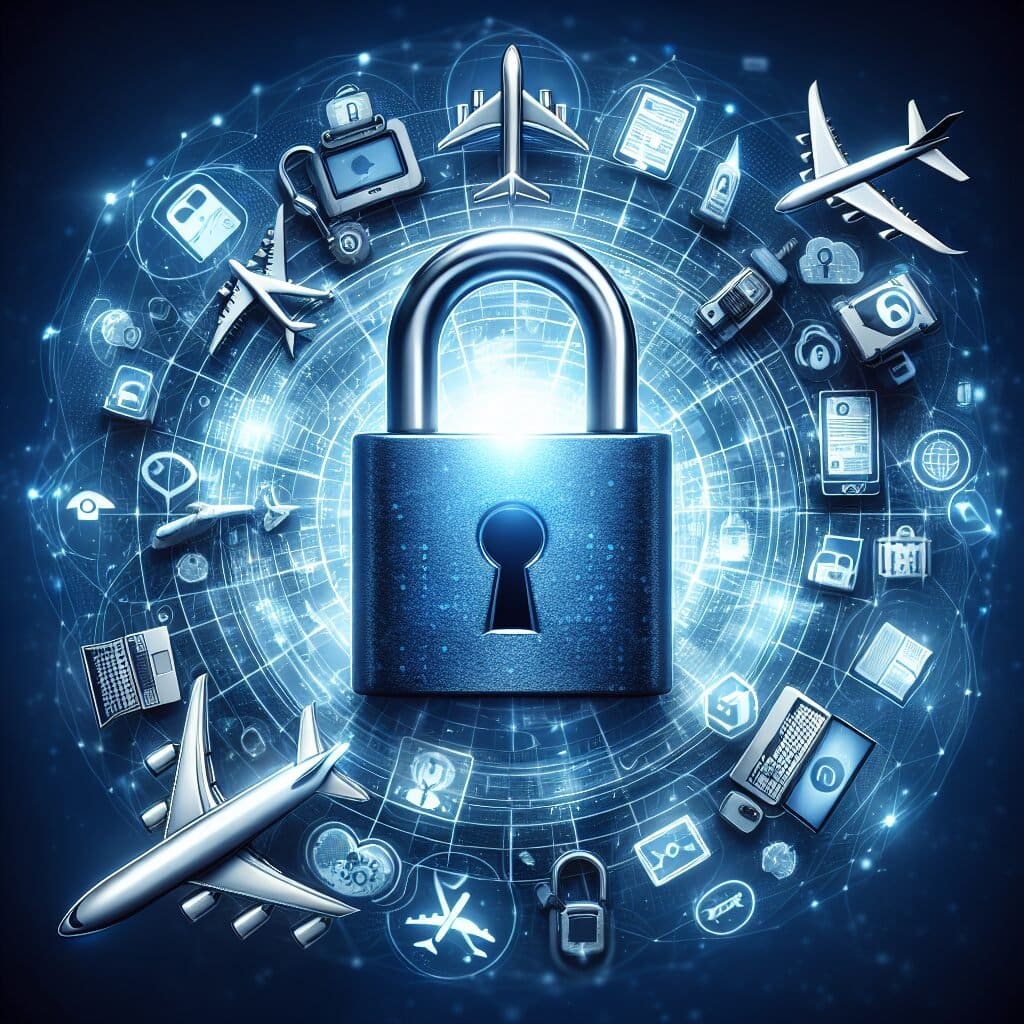As a business traveler, your primary concern is ensuring the security of your sensitive data while accessing the internet. With the increasing number of cyber threats and the growing reliance on remote connectivity, it becomes imperative to have a secure internet access solution that keeps your valuable information protected. In this article, we will explore the importance of secure internet access for business travelers and identify key strategies to safeguard your data from potential risks, enabling you to focus on your work with peace of mind.
Importance of Data Security for Business Travelers
As a business traveler, it is crucial to prioritize data security to protect sensitive information, avoid data breaches, and prevent identity theft. When you are on the go, your devices and the data they contain are at an increased risk of being compromised. However, by following best practices and implementing robust security measures, you can greatly reduce these risks and ensure the safety of your valuable data.
Protecting Sensitive Information
One of the primary concerns for business travelers is the protection of sensitive information. This includes confidential business files, client data, financial records, and personal information. To safeguard such information, it is essential to use strong, unique passwords for all your accounts, ensuring that they are not easily guessable. Additionally, encrypting your hard drives and USB devices adds an extra layer of security, making it difficult for unauthorized individuals to access your data.
Avoiding Data Breaches
Data breaches pose a significant threat to business travelers, as they can result in the theft of sensitive information and lead to financial losses for both individuals and organizations. To avoid data breaches, it is important to be cautious when connecting to public Wi-Fi networks. These networks often lack adequate encryption, making it easier for hackers to intercept and steal your data. By choosing secure internet access options, such as a Virtual Private Network (VPN) or personal hotspot, you can significantly reduce the risk of falling victim to data breaches.
Preventing Identity Theft
Identity theft is a growing concern for business travelers, as it can have severe consequences on both personal and professional levels. To prevent identity theft, it is essential to practice good password hygiene and utilize two-factor authentication whenever possible. Two-factor authentication adds an extra layer of security by requiring an additional form of verification, such as a fingerprint or a unique code sent to your mobile device. By avoiding public computer usage, you can also minimize the risk of having your personal information compromised by keyloggers or other malicious software.
Risks Associated with Public Wi-Fi Networks
Public Wi-Fi networks are popular targets for hackers, as they often lack the necessary encryption to protect users' data. When connected to a public Wi-Fi network, your data transmissions are vulnerable to various risks, including limited encryption, man-in-the-middle attacks, and eavesdropping.
Limited Encryption
Many public Wi-Fi networks have limited or no encryption in place, which means that your data is transmitted in plain text. This makes it easy for attackers to intercept and read your sensitive information, such as login credentials, emails, or personal messages. It is important to be aware of this risk and avoid transmitting any sensitive data while connected to public Wi-Fi networks.
Man-in-the-Middle Attacks
Man-in-the-Middle (MITM) attacks occur when an attacker intercepts the communication between two parties, without either party realizing it. In a public Wi-Fi setting, an attacker can position themselves between your device and the intended destination, allowing them to intercept and modify the data being transmitted. This can lead to the theft of sensitive information or the injection of malicious code into your device. By using secure internet access options, such as a VPN, you can significantly reduce the risk of falling victim to MITM attacks.
Eavesdropping on Data Transmissions
When connected to a public Wi-Fi network, your data transmissions can be susceptible to eavesdropping. Hackers can use specialized software to capture and monitor data packets being transmitted over the network. This can include private messages, emails, or any other information you send or receive while connected. To protect against eavesdropping, it is recommended to use encrypted communication channels, such as encrypted messaging apps or secure video conferencing platforms, whenever possible.
Choosing Secure Internet Access Options
To mitigate the risks associated with public Wi-Fi networks, it is crucial to choose secure internet access options when traveling for business. Here are three options that can enhance your data security:
Virtual Private Network (VPN)
A VPN provides a secure and encrypted connection between your device and the internet. It creates a virtual tunnel through which your data is transmitted, making it difficult for anyone to intercept or access your information. By using a VPN, you can encrypt your data and route it through a secure server, even when connected to public Wi-Fi networks. This significantly reduces the risk of data breaches and unauthorized access to your sensitive information.
Personal Hotspot
Using a personal hotspot allows you to create your own secure internet connection while on the go. By leveraging your mobile device's cellular data connection, you can connect your laptop or other devices to the internet without relying on potentially insecure public Wi-Fi networks. Personal hotspots provide a more controlled and secure environment for transmitting and receiving data, ensuring that your sensitive information is protected.
Roaming Data Plans
If you frequently travel internationally, consider opting for roaming data plans offered by your mobile service provider. Roaming data plans allow you to use your mobile device's data connection while abroad, eliminating the need to connect to unfamiliar and potentially insecure Wi-Fi networks. By relying on your cellular data connection, you can have peace of mind knowing that your data is being transmitted through a secure and encrypted network.
Implementing Robust Password and Authentication Practices
Passwords are the first line of defense when it comes to securing your accounts and data. Implementing robust password and authentication practices is crucial for protecting your sensitive information from unauthorized access.
Using Strong, Unique Passwords
Using strong, unique passwords is imperative to protect your accounts from being compromised. Avoid using common passwords or easily guessable information such as your birthdate or pet's name. Instead, create complex passwords that include a combination of upper and lowercase letters, numbers, and special characters. Additionally, it is important to use different passwords for each of your accounts to prevent a single data breach from compromising multiple accounts.
Utilizing Two-Factor Authentication
Two-factor authentication (2FA) adds an extra layer of security to your accounts by requiring an additional form of verification along with your password. This can include a fingerprint scan, a unique code sent to your mobile device, or a physical security key. By enabling 2FA, even if your password is compromised, an attacker would still need the second factor to gain access to your account. Utilize 2FA whenever possible to enhance the security of your accounts and prevent unauthorized access.
Avoiding Public Computer Usage
While traveling, it may be tempting to use public computers for convenience. However, doing so puts your sensitive information at risk. Public computers can be infected with keyloggers or other malware designed to capture your login credentials and other personal information. Avoid using public computers for accessing sensitive accounts or conducting any transactions involving personal or financial data. Instead, rely on your own trusted devices or secure internet access options mentioned earlier.
Securing Devices and Data Storage
Securing your devices and data storage plays a crucial role in protecting your confidential information and preventing unauthorized access.
Encrypting Hard Drives and USB Devices
Encrypting your hard drives and USB devices provides an additional layer of security for your data. Encryption scrambles your data, making it unreadable to anyone who does not have the decryption key. In the event that your device or storage medium is lost or stolen, encryption ensures that your sensitive information remains protected. Implementing full-disk encryption on your laptop and using encrypted USB drives can safeguard your data from unauthorized access.
Using Biometric Authentication
Biometric authentication, such as fingerprint or facial recognition, adds an extra layer of protection to your devices. By utilizing biometrics, you can ensure that only authorized individuals have access to your device and the sensitive information it contains. Biometric authentication is more secure than passwords, as it is unique to each individual and difficult to replicate or guess.
Regularly Backing Up Data
Regularly backing up your data is crucial to protect against data loss in the event of device theft, damage, or hardware failure. Backup your data to an external hard drive, a secure cloud storage service, or both, depending on your preferences and the level of security needed. By having a recent backup of your data, you can quickly restore it in case of an incident, preventing significant disruptions to your work and minimizing potential losses.
Installing and Updating Security Software
Installing and regularly updating security software is essential for protecting your devices from malware, viruses, and other online threats.
Antivirus and Anti-Malware Programs
Antivirus and anti-malware programs are vital tools for detecting and removing malicious software from your devices. These programs scan your system for known threats and suspicious activity, helping to prevent malware infections and data breaches. Ensure that you have a reputable antivirus and anti-malware software installed on all your devices and keep them updated to defend against emerging threats.
Firewalls and Intrusion Detection Systems
Firewalls act as a barrier between your device and potential unauthorized access, monitoring incoming and outgoing network traffic. They help filter out malicious data and protect your device from unauthorized access attempts. Intrusion Detection Systems (IDS) monitor network traffic for any suspicious or malicious activity, providing an additional layer of defense against potential attacks. It is important to have firewalls enabled on your devices and consider using IDS to enhance your network security.
Automatic Software Updates
Keeping your operating system, applications, and security software up to date is crucial for maintaining the security and performance of your devices. Software updates often include patches for known vulnerabilities, ensuring that your devices are protected against the latest threats. Enable automatic updates whenever possible or regularly check for and install updates manually to ensure that your devices are running the latest, most secure versions of the software.
Educating Business Travelers on Security Best Practices
Education and awareness play a vital role in enhancing data security for business travelers. By educating yourself and your employees about security best practices, you can significantly reduce the risk of falling victim to cyber threats.
Recognizing Phishing Attempts
Phishing is a common technique used by attackers to trick individuals into revealing sensitive information. Phishing attempts often involve fraudulent emails, text messages, or websites that mimic legitimate organizations. Educate yourself and your employees about the warning signs of phishing, such as suspicious email domains, spelling and grammar errors, or requests for personal or financial information. Be cautious when providing information online and always verify the legitimacy of the source before clicking on any links or providing sensitive data.
Avoiding Downloading Untrusted Software
Downloading untrusted software can expose your devices to malware and other security risks. Only download software, applications, or updates from trusted sources, such as official app stores or verified websites. Be cautious of third-party download sites or emails with attachments from unknown senders, as they may contain malicious software designed to compromise your device or steal your data. Stick to reputable sources to minimize the risk of downloading untrusted software.
Securing Physical Documents
While much of our data is stored digitally, it is still important to secure physical documents when traveling. Avoid carrying unnecessary sensitive documents with you and store them securely when not in use. Consider using a lockable briefcase or bag to transport any physical documents containing confidential information. If you need to dispose of any physical documents, ensure they are properly shredded or destroyed to prevent unauthorized access.
Ensuring Secure Communication Channels
Secure communication channels are essential for protecting the privacy and confidentiality of your conversations and information when traveling for business.
Utilizing Encrypted Messaging Apps
When communicating sensitive information, it is crucial to use encrypted messaging apps that prioritize user privacy and data security. Encrypted messaging apps use end-to-end encryption, ensuring that only the intended recipients can access the messages. Popular encrypted messaging apps include Signal, WhatsApp, and Telegram. By utilizing these apps, you can ensure that your conversations remain confidential and protected from interception or eavesdropping.
Avoiding Unsecured Email Transmission
Emails, although widely used for business communication, are not always secure. Unsecured email transmission puts your messages and attachments at risk of interception or tampering. Whenever possible, use encrypted email services or email encryption tools to ensure that your emails are protected. These services encrypt your messages and require the recipient to have the appropriate decryption key to access the content, making it more difficult for unauthorized individuals to read your emails.
Using Secure Video Conferencing Platforms
In today's digital age, video conferencing has become an integral part of business communication. When participating in video conferences, it is essential to choose secure platforms that prioritize data security and privacy. Look for platforms that offer end-to-end encryption and other security features, such as password protection and participant authentication. By using secure video conferencing platforms, you can prevent unauthorized access and protect the confidentiality of your meetings and discussions.
Maintaining Situational Awareness
Maintaining situational awareness is crucial to identify and mitigate potential security risks when traveling for business.
Monitoring Network Activity
Be vigilant about monitoring your network activity and identifying any suspicious behavior. Keep an eye on your devices for any signs of unauthorized access or unusual network activity. If you notice any unusual behavior, disconnect from the network and report it to your organization's IT department or your security team. By promptly addressing potential security incidents, you can prevent further compromise of your data.
Avoiding Suspicious Websites and Links
Exercise caution when browsing the internet and be wary of suspicious websites or links. Avoid clicking on links from unknown sources or websites that appear suspicious. Phishing attempts often involve deceptive links that lead to fake login pages designed to steal your credentials or to websites containing malware. Hover over links to preview the URL before clicking on them and verify the legitimacy of a website before providing any personal or sensitive information.
Being Cautious of Physical Surroundings
While traveling, it is important to be aware of your physical surroundings and the potential risks they pose to your data security. Keep an eye out for shoulder surfers, individuals who may attempt to observe your screen or steal information by watching as you enter passwords or access sensitive data. Be cautious when using ATMs or card readers, as they can be compromised with skimming devices that steal your card information. By maintaining a high level of vigilance and being mindful of your surroundings, you can minimize the risk of physical attacks on your data security.
Monitoring and Responding to Potential Security Breaches
Despite implementing various security measures, it is important to acknowledge that security breaches can still occur. Being proactive in monitoring and responding to potential security breaches ensures prompt investigation and resolution.
Implementing Incident Response Plans
Having a well-defined incident response plan in place is crucial for effectively handling security breaches. An incident response plan outlines the steps to be followed in the event of a security incident, including communication protocols, escalation procedures, and the involvement of appropriate stakeholders. By implementing an incident response plan, you can minimize the impact of a security breach, mitigate the risks, and swiftly respond to protect your sensitive data.
Performing Regular Security Audits
Regularly conducting security audits helps identify potential vulnerabilities and weaknesses in your security infrastructure. These audits involve evaluating and testing your systems, network, and applications to identify any vulnerabilities that could be exploited by attackers. By identifying and addressing these vulnerabilities in a timely manner, you can ensure that your data security measures remain effective and up to date.
Ensuring Prompt Investigation and Resolution
Promptly investigating and resolving any potential security breaches is vital to minimize the impact on your data security. In the event of a suspected breach, immediately notify your organization's IT department or security team so that they can initiate an investigation and take appropriate actions. This may include revoking access credentials, resetting passwords, or initiating forensic analysis. Timely response and resolution reduce the potential damage caused by a breach and help prevent further compromise of your data.
In conclusion, data security is of utmost importance for business travelers. By protecting sensitive information, avoiding data breaches, preventing identity theft, and implementing various security measures, you can significantly reduce the risks associated with traveling and ensure the safety of your valuable data. It is crucial to choose secure internet access options, utilize robust password and authentication practices, secure devices and data storage, install and update security software, educate yourself and your employees on security best practices, ensure secure communication channels, maintain situational awareness, and monitor and respond to potential security breaches. By following these guidelines and staying vigilant, you can safeguard your data and maintain the confidentiality and integrity of your information while traveling for business.











